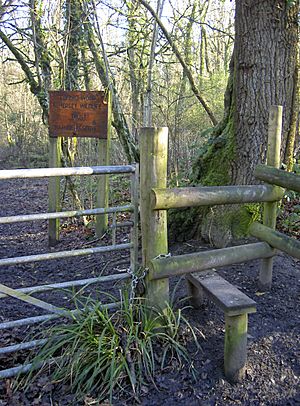Edford Woods and Meadows facts for kids
| Site of Special Scientific Interest | |
 |
|
| Area of Search | Somerset |
|---|---|
| Coordinates | 51°14′05″N 2°28′52″W / 51.23469°N 2.48121°W |
| Interest | Biological |
| Area | 54.3 hectares (0.543 km2; 0.210 sq mi) |
| Notification | 1957 |
Edford Woods and Meadows is a very special natural area in Somerset, England. It covers about 54.3 hectares, which is like 134 football fields! This area was officially recognized in 1957 as a Site of Special Scientific Interest (SSSI). This means it's a place with unique plants, animals, or geology that needs to be protected.
Edford Woods and Meadows is important because it has many different kinds of natural forests and untouched meadows. These types of habitats are now quite rare across Britain. Protecting this site helps to keep these special places safe for the future.
What Makes Edford Woods and Meadows Special?
This site is a great example of what are called "ancient woodlands." These are forests that have been around for a very long time, often for hundreds of years. They haven't been planted by people recently. This means they have a rich history and are home to many different kinds of plants and animals that depend on old forests.
Why Are Unimproved Meadows Important?
The meadows at Edford are "unimproved." This means they haven't been changed much by farming or building. They haven't had artificial fertilizers added, and they haven't been plowed. Because of this, they are full of wild flowers and grasses that are not often seen in other places. These meadows provide food and homes for many insects, birds, and small mammals.
What Trees and Plants Grow Here?
The forests in Edford Wood are mostly filled with Ash and Alder trees. You can also find large Pedunculate Oak and Sessile Oak trees growing tall. Below these big trees, there's a thick layer of smaller plants and bushes called the undergrowth.
This undergrowth includes plants like Hazel and many other species. The types of plants you see change depending on the soil. In the wetter parts of the valley floor, different plants grow compared to the drier soil higher up the hillsides. One very special plant found here is a rare herb called monk's hood. It grows in large numbers in this area, which is unusual.

